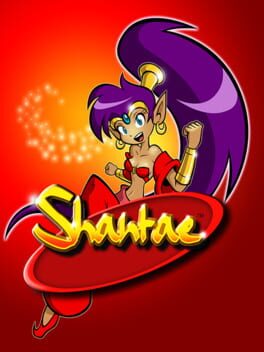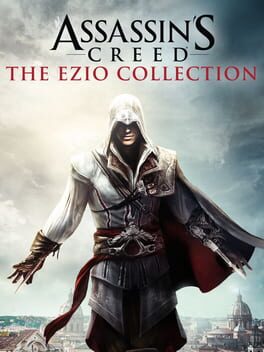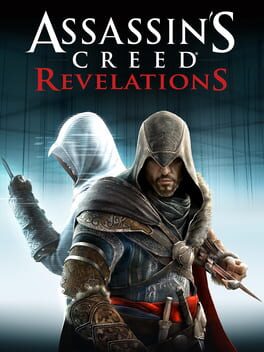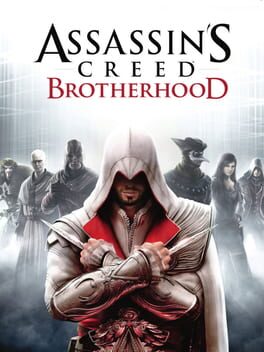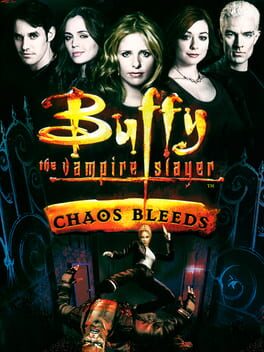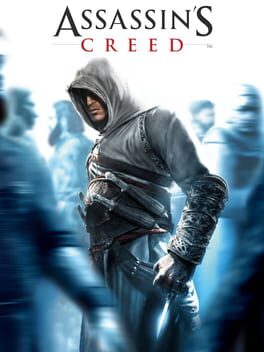terminustrack
Bio
This saves me spamming my friends with thoughts about mid 00s tie in games.
This saves me spamming my friends with thoughts about mid 00s tie in games.
Badges

3 Years of Service
Being part of the Backloggd community for 3 years

N00b
Played 100+ games

On Schedule
Journaled games once a day for a week straight
162
Total Games Played
005
Played in 2024
159
Games Backloggd
Recently Played See More
Recently Reviewed See More
Cute lines, fun combat variety, and great recreations of Sunnydale are hampered by often frustrating to the point of baffling puzzles, harsh checkpointing, and confusing level designs. Worth playing for the Buffy devotee, and definitely some good here - an extensive array of extras, and a dedicated multiplayer mode are inessential so inherently welcome surprises - but it feels a little like cookie dough - lovely, but a little more baking required. But I got to fight vampires as Spike and Faith, so can't all be bad.
When I first played this game as a teenager, I remember finding it interesting, if frustrating. I knew that the better games were apparently yet to come, and didn't quite understand the potential of this game. Nevertheless, I remembered it fondly.
Revisiting it years later: this game came alive for me. In Assassin's Creed, you play as Altair, a member of an order of Assassins during the Third Crusade. The Assassins are caught between the different factions of this war, and obstensibly wish to bring around peace - something Altair is tasked to do by bringing around the death of corrupt, cruel, or conniving public figures, stationed in the cities of Jerusalem, Acre, and Damascus.
Whilst the controls are prone to occasional bouts of clunkiness - I found myself once in a while muttering 'Altair, no, why,' - they have a great deal of potential to them, that makes freerunning and exploration a case of actively planning and taking risks, particularly when Altair gains the ability to grab onto things when falling. The game may highlight safe ledges to leap from with pigeons and hay, but the range of abilities you're given for movement, whilst taking a while to pick up, provide a great many options for surpsingly creative exploration, making the slighly samey streets within each city a joy to find your way around.
This goes for the combat too. You're only given three real weapons - the hidden blade, the short sword/throwing knife, and the long sword - but much as with the exploration, as you gain more ability it becomes more fun. The hidden blade especially is a case of this, impossible to use during group battles in the early game, later it's fantastically satisfying to pull off. The stereotype of these games combat is wait and counter, but with the hidden blade, you're in a standoff with the guards, waiting for one to start yelling orders - and to take him off guard with a knife to the neck, scaring another, who falls, and so on. Hidden complexities are throughout the game.
The biggest point of contention may be the repetitiveness of the main gameplay loop - travelling to a city, completing mini missions to investigate your target, then assassinating them. However, these missions are often so quick as to be done within an hour total - their real point is to reward diving deeper into the game. Completing all six investigations for a target (only three are required to trigger the final assassination) provide both hints for gameplay, such as less guarded areas, potential escape routes, and elaborations of the story. Much of the narrative is told through the letters you steal, or the unguarded conversations of guards, showing the links between targets, or what the people of the city really think of their rulers. Whilst the main narrative of Altair is interesting, if a little rote - a classic 'he changes because the plot demands it' story, if having some interesting twists - this is the real story, of conspiracies and death dealers during a war.
This also carries over to the (spoiler alert!) brief modern day section of the game, set in the far future year of 2012. Desmond Miles, the player character in these sections, provides a fun counterbalance to the ominious and serious dialogue that fills the rest of the game, but most of the meat here is found in the - all to easy to miss - computer logs that eagle eyed players may access, giving a great sense of looming doom to the world, that goes perfectly with the stark, overwhelming white and greys that make up the claustrophobic rooms of the modern day faciliites, even the outside world just an abstraction of whites through the windows.
The highlight of the gameplay is the assassinations themselves, all unique from each other. Some will test your stealth, as you sneak through guards and drop down to your target, others your combat, others still your platforming - a particularly tricky section requiring precise control as Altair - unable to swim - lurks across a collection of boats.
As briefly mentioned, the presentation is gorgeous. Whilst the cities themselves are a little hard to navigate, with houses and geography often blending into each other, they create a great sense of mood- grey, dialpidated houses showing the effects of the war, a green so lush you can almost feel the humidity. And the landmarks give everything a sense of scale, that makes the viewpoints (mini challenges of high points in the city that clear the fog of the map) satisfying to climb, just for the view, Altair dwarfed by an expanse of the city.
The game is dated in some ways, and sequels would streamline the gameplay, improve the pacing, give the stories great emotional weight (and more memorable characters). But it is still well worth a revisit, and if the time is taken to dig into it, carries fascinating quirks and complexities that keep it enduring to this day.
Revisiting it years later: this game came alive for me. In Assassin's Creed, you play as Altair, a member of an order of Assassins during the Third Crusade. The Assassins are caught between the different factions of this war, and obstensibly wish to bring around peace - something Altair is tasked to do by bringing around the death of corrupt, cruel, or conniving public figures, stationed in the cities of Jerusalem, Acre, and Damascus.
Whilst the controls are prone to occasional bouts of clunkiness - I found myself once in a while muttering 'Altair, no, why,' - they have a great deal of potential to them, that makes freerunning and exploration a case of actively planning and taking risks, particularly when Altair gains the ability to grab onto things when falling. The game may highlight safe ledges to leap from with pigeons and hay, but the range of abilities you're given for movement, whilst taking a while to pick up, provide a great many options for surpsingly creative exploration, making the slighly samey streets within each city a joy to find your way around.
This goes for the combat too. You're only given three real weapons - the hidden blade, the short sword/throwing knife, and the long sword - but much as with the exploration, as you gain more ability it becomes more fun. The hidden blade especially is a case of this, impossible to use during group battles in the early game, later it's fantastically satisfying to pull off. The stereotype of these games combat is wait and counter, but with the hidden blade, you're in a standoff with the guards, waiting for one to start yelling orders - and to take him off guard with a knife to the neck, scaring another, who falls, and so on. Hidden complexities are throughout the game.
The biggest point of contention may be the repetitiveness of the main gameplay loop - travelling to a city, completing mini missions to investigate your target, then assassinating them. However, these missions are often so quick as to be done within an hour total - their real point is to reward diving deeper into the game. Completing all six investigations for a target (only three are required to trigger the final assassination) provide both hints for gameplay, such as less guarded areas, potential escape routes, and elaborations of the story. Much of the narrative is told through the letters you steal, or the unguarded conversations of guards, showing the links between targets, or what the people of the city really think of their rulers. Whilst the main narrative of Altair is interesting, if a little rote - a classic 'he changes because the plot demands it' story, if having some interesting twists - this is the real story, of conspiracies and death dealers during a war.
This also carries over to the (spoiler alert!) brief modern day section of the game, set in the far future year of 2012. Desmond Miles, the player character in these sections, provides a fun counterbalance to the ominious and serious dialogue that fills the rest of the game, but most of the meat here is found in the - all to easy to miss - computer logs that eagle eyed players may access, giving a great sense of looming doom to the world, that goes perfectly with the stark, overwhelming white and greys that make up the claustrophobic rooms of the modern day faciliites, even the outside world just an abstraction of whites through the windows.
The highlight of the gameplay is the assassinations themselves, all unique from each other. Some will test your stealth, as you sneak through guards and drop down to your target, others your combat, others still your platforming - a particularly tricky section requiring precise control as Altair - unable to swim - lurks across a collection of boats.
As briefly mentioned, the presentation is gorgeous. Whilst the cities themselves are a little hard to navigate, with houses and geography often blending into each other, they create a great sense of mood- grey, dialpidated houses showing the effects of the war, a green so lush you can almost feel the humidity. And the landmarks give everything a sense of scale, that makes the viewpoints (mini challenges of high points in the city that clear the fog of the map) satisfying to climb, just for the view, Altair dwarfed by an expanse of the city.
The game is dated in some ways, and sequels would streamline the gameplay, improve the pacing, give the stories great emotional weight (and more memorable characters). But it is still well worth a revisit, and if the time is taken to dig into it, carries fascinating quirks and complexities that keep it enduring to this day.

